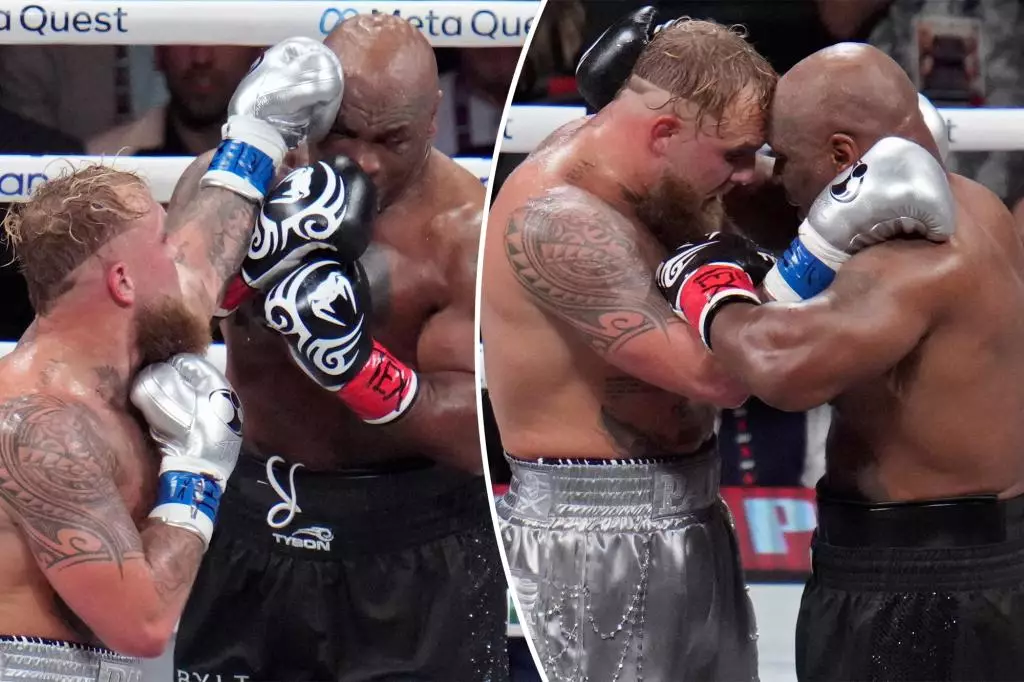The recent boxing match between YouTube sensation Jake Paul and boxing legend Mike Tyson polarized viewers, sparking debate over the event’s legitimacy and entertainment value. The fight took place on a glorified stage at the AT&T Stadium in Arlington, Texas, drawing a blend of die-hard boxing fans and celebrity watchers. While the buildup was rife with drama, the actual fight itself lacked the intensity that many anticipated, showcasing the difference in skill and physical condition between the two fighters.
As expected, the atmosphere was electric, with fans buzzing in the seats and big-name celebrities present, including Charlize Theron and Shaquille O’Neal, adding a glimmer of Hollywood to the night. However, as the match wore on, the audience’s enthusiasm waned, leading to discontent and even boos towards the conclusion of the eighth round. This reaction highlighted a critical gap; the spectacle of celebrity boxing often has more in common with performance art than with legitimate sporting competition.
Both fighters made memorable entrances that encapsulated their contrasting personas. Jake Paul arrived in a flashy low rider, accompanied by his brother Logan, while the iconic Tyson opted for simplicity. Paul’s choice of entrance music, Phil Collins’ “In the Air Tonight”, invoked nostalgia while also cleverly tying back to Tyson’s past in pop culture, specifically his notable appearance in “The Hangover.” Tyson, on the other hand, paid tribute to his late daughter, Exodus, a heartfelt gesture that resonated with many, juxtaposing the raucous environment with solemnity.
Despite the initial thrill of the entrances, the fight itself became an anti-climactic tableau. Tyson, at 58 years old, appeared hampered by age, managing only sporadic punches against his younger opponent. As skilled and iconic as Tyson has been throughout his career, it was evident that the years had taken a toll, blurring the lines between his historical prowess and current capabilities.
Tensions simmered in the lead-up to the bout, marked notably by an altercation during the pre-fight weigh-in. Tyson’s slap, delivered in response to what he perceived as Paul’s disrespect, served to heighten their rivalry and thrust the match into the realm of personal vendetta. Tyson’s reflections on the incident showcased his volatility, stating he was taken aback by what he believed was an intentional provocation, which he described as painful. Paul, meanwhile, portrayed the incident as a mere joke, claiming the slap was insignificant.
This exchange highlights a characteristic of celebrity boxing that often overshadows the sport itself: the emphasis on pre-fight drama and posturing over technical skill. For many in attendance and watching from home, this incident galvanized interest but, ultimately, set up an expectation that was not met once the match started.
In the aftermath of the fight, reactions have ranged from disappointment to admiration for both fighters. Jake Paul, having declared his victory, attempted to capitalize on his newfound status while simultaneously challenging Tyson’s legacy. Paul’s bravado after the match—his insistence that “it’s personal” and taunts about Tyson’s punching power—reflects the complicated nature of celebrity boxing, where self-promotion often overrides sportsmanship.
Yet, the fight serves as a broader commentary on the state of boxing today. The clash of traditional athletic prowess with the antics of social media personalities raises questions about the future of the sport. As younger fighters like Paul continue to gain prominence through unconventional means, traditionalists may fear a dilution of the sport’s integrity.
The bout between Jake Paul and Mike Tyson encapsulated the current flux in sports entertainment, where the allure of celebrity often overshadows the essence of athletic competition. While the event had many entertaining qualities, it also exposed the pitfalls and contradictions inherent in the rise of celebrity showcases in what once was a revered sport. The contractual battles of entertainment and sport will undoubtedly continue, as will the debates surrounding their value in a rapidly evolving landscape.

Leave a Reply